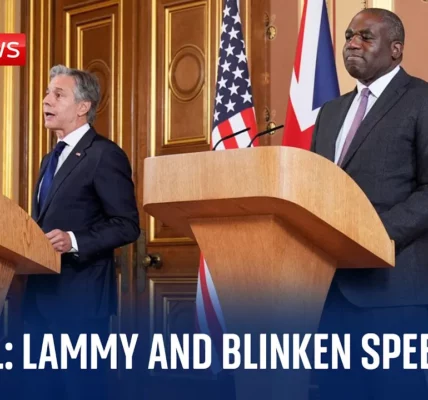Get Ready for an Election Like No Other: Analyzing America and Lebanon’s Current Situations

This article provides a comprehensive overview of the current political and military climate, focusing on the impending U.S. elections and the escalating tensions in Lebanon. Join us as we delve into the intricacies of these significant events shaping the world today.
Introduction
As America navigates a deeply divided political landscape, the upcoming elections promise to be unlike any other in recent memory. Concurrently, the situation in Lebanon intensifies, with military operations reported and international reactions unfolding. This article explores the intersections of these events, analyzing the implications for both domestic and foreign policy.
The Political Climate in America
The U.S. is on the brink of a significant election cycle, characterized by heightened tensions and polarized opinions. The upcoming elections are not just a referendum on policies but a reflection of the current societal divisions.
The Stakes of the Election
With issues ranging from economic recovery to social justice at the forefront, voters are more engaged than ever. Key points to consider include:
- Voter turnout is expected to be high, reflecting the urgency of the issues at stake.
- Campaign strategies will likely focus heavily on social media and direct voter engagement.
- The role of misinformation and its impact on public perception and voter behavior.
Key Players and Their Strategies
As candidates prepare to hit the campaign trail, their strategies vary widely:
- Incumbents will likely emphasize their achievements while addressing criticism.
- Challengers may focus on grassroots movements and local issues that resonate with specific demographics.
- Both parties will need to address the growing concerns around electoral integrity and public trust.
Escalating Tensions in Lebanon
The situation in Lebanon is rapidly evolving, with reports of military operations and heavy shelling. The implications of these developments extend beyond the region, affecting international relations and security dynamics.
Military Operations and Their Implications
Recent reports indicate that Israel’s military operations in Southern Lebanon are intensifying:
- Heavy shelling has been reported, with ground assaults anticipated.
- The Israeli government’s messaging suggests a strategic aim to limit the influence of Hezbollah.
- International reactions, particularly from the U.S., have raised concerns about escalation into broader conflict.
Reactions from the International Community
As tensions rise, world leaders are closely monitoring the situation:
- The U.S. has reiterated its commitment to Israel while urging restraint.
- Regional powers are recalibrating their stances depending on the unfolding events.
- Humanitarian considerations are becoming increasingly urgent as civilian populations are affected.
The Interplay Between Domestic and International Politics
The current political climate in America and the conflict in Lebanon are interconnected in ways that may not be immediately apparent. Understanding this interplay is crucial for discerning future developments.
Domestic Implications of Foreign Policy Decisions
How the U.S. handles its foreign policy regarding Lebanon could influence domestic political dynamics:
- Public opinion on military intervention and support for allies can sway voter sentiment.
- Political leaders may use foreign policy issues to distract from domestic challenges.
- There is a potential for backlash against perceived military overreach or inaction.
Future Prospects and Predictions
Looking ahead, several scenarios could unfold:
- Increased military engagement could lead to a broader conflict, impacting U.S. interests.
- Successful diplomacy could stabilize the region, providing a boost for incumbents in the elections.
- Failure to address these issues may result in domestic unrest and political ramifications.
Conclusion
The convergence of the U.S. elections and the situation in Lebanon underscores the complexities of modern governance and international relations. As events unfold, it is crucial for citizens to stay informed and engaged. Understanding these dynamics can empower voters and encourage active participation in shaping their political landscape. We invite you to explore more about these topics and join discussions on their implications.
“`




